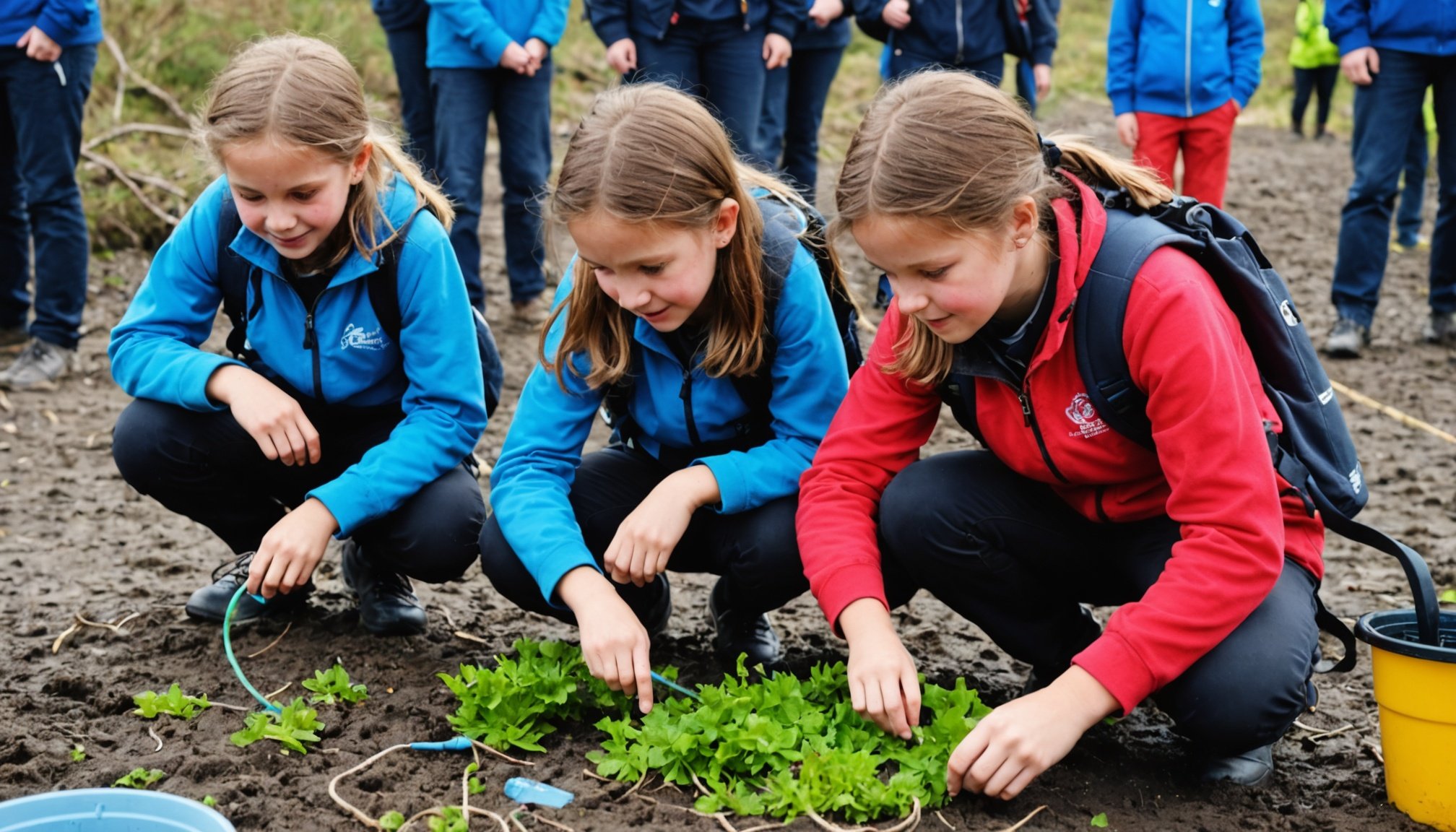Unveiling Marine Conservation Education for UK Youth: Innovative Programs Raising Awareness Among Children
In the face of escalating environmental challenges, particularly climate change and the degradation of marine ecosystems, it has become imperative to educate and engage the younger generation in marine conservation. This article delves into the innovative programs and initiatives that are raising awareness and fostering a sense of responsibility among UK youth regarding the health of our oceans.
The Importance of Marine Conservation Education
Marine conservation education is not just a niche interest; it is a critical component of broader environmental education and sustainable development. The ocean, often referred to as the “lungs of the Earth,” plays a vital role in regulating the climate, providing half of the oxygen we breathe, and serving as a source of food for billions of people.
In parallel : Effective approaches for uk residents to minimize bird strikes on skyscrapers
“Education is the key to unlocking the potential of young people to become the stewards of our planet,” says Dr. Jane Smith, a marine biologist at a leading UK university. “By teaching children about the importance of marine conservation, we are not only equipping them with knowledge but also inspiring them to take action.”
Innovative Programs in Marine Conservation Education
Several organizations and educational institutions in the UK are pioneering innovative programs to engage young people in marine conservation.
Also to discover : Innovative hatchery solutions for automation and connectivity
School-Based Initiatives
Schools are at the forefront of introducing marine conservation education to young minds. Here are a few examples:
- Curriculum Integration: Many schools have incorporated marine science and environmental education into their curriculum. For instance, the UK’s National Curriculum includes modules on marine ecosystems and the impact of human activities on the ocean.
- Field Trips and Workshops: Organizations like the Marine Conservation Society (MCS) offer educational field trips and workshops where students can participate in beach cleanups, marine life surveys, and other hands-on activities.
- Digital Resources: With the rise of digital learning, platforms like Google Scholar and educational apps are providing accessible resources for students to learn about marine science and conservation.
University and Research Programs
Universities and research institutions are also playing a crucial role in fostering marine conservation education among young people.
- Research Opportunities: Many universities offer research internships and volunteer programs for students to participate in marine conservation projects. For example, the University of Plymouth’s Marine Institute provides students with opportunities to engage in research projects related to ocean health and sustainability.
- International Collaborations: International programs, such as those offered by Globalong, allow students to participate in global marine conservation efforts. These programs not only provide hands-on experience but also expose students to different cultural and scientific approaches to conservation[1].
Community and Volunteer Programs
Community and volunteer programs are another vital aspect of marine conservation education.
- Beach Cleanups and Citizen Science: Organizations like the Surfers Against Sewage (SAS) and the MCS organize regular beach cleanups and citizen science projects where young people can contribute to data collection and conservation efforts.
- Youth-Led Initiatives: Young people are increasingly taking the lead in marine conservation. For example, the Youth Media Alliance’s conferences and workshops empower young people to create media content that raises awareness about marine conservation issues[3].
Practical Insights and Actionable Advice
Here are some practical insights and actionable advice for those interested in engaging with marine conservation education:
For Students
- Participate in School Programs: Take advantage of school programs and field trips that focus on marine conservation.
- Volunteer: Join local organizations or participate in volunteer programs that work on marine conservation projects.
- Stay Informed: Use digital resources and academic journals like Google Scholar to stay updated on the latest research and developments in marine science.
For Educators
- Integrate Marine Science into the Curriculum: Incorporate modules on marine ecosystems and conservation into the school curriculum.
- Collaborate with Organizations: Partner with organizations like the MCS and SAS to provide students with hands-on experiences in marine conservation.
- Use Digital Tools: Utilize digital resources and educational apps to make learning about marine science engaging and accessible.
For Parents
- Encourage Participation: Encourage your children to participate in school programs and volunteer activities related to marine conservation.
- Lead by Example: Engage in family activities such as beach cleanups and nature walks to instill a sense of responsibility towards the environment.
- Support Educational Resources: Support the use of educational resources and digital tools that focus on marine conservation.
Table: Comparing Marine Conservation Education Programs
| Program | Target Audience | Key Activities | Location |
|---|---|---|---|
| Marine Conservation Society (MCS) | Schools and Communities | Beach cleanups, marine life surveys, educational workshops | UK-wide |
| Globalong | University Students and Volunteers | Research projects, fieldwork in marine conservation | International |
| Surfers Against Sewage (SAS) | Communities and Schools | Beach cleanups, citizen science projects | UK-wide |
| University of Plymouth’s Marine Institute | University Students | Research internships, marine science courses | Plymouth, UK |
| Youth Media Alliance | Young Media Professionals | Conferences, workshops, media content creation | Canada and International |
Detailed List of Activities for Marine Conservation Education
Here is a detailed list of activities that can be integrated into marine conservation education programs:
- Beach Cleanups: Organize regular beach cleanups where students can collect data on marine litter and its impact on marine life.
- Marine Life Surveys: Conduct surveys to identify and record marine species, which helps in understanding biodiversity and ecosystem health.
- Educational Workshops: Host workshops that include lectures, discussions, and interactive activities to educate students about marine ecosystems and conservation.
- Research Projects: Engage students in research projects that focus on various aspects of marine science, such as oceanography, marine biology, and conservation biology.
- Citizen Science Projects: Involve students in citizen science projects where they can contribute to data collection and analysis, helping scientists and policymakers make informed decisions.
- Digital Content Creation: Encourage students to create digital content such as videos, blogs, and social media posts to raise awareness about marine conservation issues.
- Field Trips: Organize field trips to marine protected areas, research stations, and other relevant sites to provide hands-on learning experiences.
- Collaborations with Local Communities: Work with local communities to develop and implement conservation projects, fostering a sense of community involvement and ownership.
Quotes from Experts and Participants
- “Marine conservation education is not just about teaching facts; it’s about inspiring a generation to care for and protect our oceans.” – Dr. John Taylor, Marine Biologist
- “Participating in the beach cleanup was eye-opening. It made me realize how much of an impact our daily actions have on the ocean.” – Emily, High School Student
- “The research internship at the University of Plymouth’s Marine Institute was a life-changing experience. It gave me the skills and knowledge to pursue a career in marine conservation.” – James, University Student
Marine conservation education is a critical component of our collective effort to protect the world’s oceans. By engaging young people through innovative programs, we can foster a new generation of stewards who are equipped with the knowledge, skills, and passion to address the complex environmental challenges facing our planet.
As we move into the Ocean Decade (2021-2030), a global initiative to advance ocean science and conservation, the role of education becomes even more pivotal. By integrating marine science into school curricula, providing research opportunities, and engaging communities in conservation efforts, we can ensure a sustainable future for our oceans and the world at large.
In the words of Julia P., an biology student who participated in a marine conservation program in Greece, “This experience was transformative. It not only gave me skills in marine research but also a deep understanding of the importance of protecting marine ecosystems for future generations.”[1]
As we continue to navigate the complexities of climate change and environmental degradation, it is clear that the future of our oceans depends on the actions we take today. By investing in marine conservation education, we are not only educating young people but also ensuring a sustainable and healthy planet for generations to come.











